Firm Dynamics and Employment Outcomes
In a market economy, firm foundations and closures are important drivers of resource (re)allocation, structural change, and economic development which is particularly important with respect to the economic transformation of East Germany from a state-directed to a market economy. At the same time, job displacement coming along with structural change may have serious consequences for affected employees, such as unemployment, earnings losses, or lower job quality in a new job. This research group uses microeconometric methods to analyze foundation, evolution, and failure of firms, the amount and quality of jobs created by new firms and the consequences of firm closures for employees, in particular in terms of labor market outcomes such as employment and wages.
Research Cluster
Productivity and InstitutionsYour contact

Mitglied - Department Structural Change and Productivity
EXTERNAL FUNDING
01.2020 ‐ 06.2024
The Rise of Populist Parties in Europe: The Dark Side of Globalization and Technological Change?
VolkswagenStiftung
Globalisation may have increased prosperity in general, but has also led to unemployment, wage inequality, outward migration and, thus, ageing populations in many European regions. This project examines whether these economic burdens lead to votes for populist parties.
01.2019 ‐ 06.2022
MICROPROD („Raising EU Productivity: Lessons from Improved Micro Data“)
European Commission
The goal of MICROPROD is to contribute to a greater understanding of the challenges brought about in Europe by the fourth industrial revolution and the associated ‘productivity puzzle’ in a context of globalisation and digitisation, and to provide alternative policy options to better address these challenges.
This project has received funding from the European Union’s Horizon 2020 research and innovation programme under grant agreement No 764810.
07.2018 ‐ 12.2020
Firm Wage Differentials in Imperfect Labour Markets: The Role of Market Power and Industrial Relations in Rent Splitting between Workers and Firms
German Research Foundation (DFG)
The main purpose of this proposal is to grasp a firmer understanding of how employment rents are split between workers and employers in imperfect labour markets and how labour market institutions, such as unions and works councils, influence the distribution of rents. In that it not only promises new insights into the wage formation process and the likely consequences of important labour market trends like falling unionisation and worker codetermination, but also promises to inform important public policy debates, such as which rights should be granted to organised labour.
02.2019 ‐ 09.2019
Evaluation of the IAB Establishment Panel 2018 and Preparation of a Results Report for West and East Germany
Final report: Fehlende Fachkräfte in Deutschland – Unterschiede in den Betrieben und mögliche Erklärungsfaktoren: Ergebnisse aus dem IAB-Betriebspanel 2018. IAB-Forschungsbericht 10/2019. (in German, English abstract available)
04.2016 ‐ 03.2019
Wage and Employment Effects of Bankruptcies
German Research Foundation (DFG)
The project analyzes the process and the consequences of firm failure. For the first time, evidence on the consequences of small firms’ bankruptcy on employees’ earnings and wages is provided. The project e.g. shows that employees of small firms are more likely to see their employer failing but, at the same time, face smaller earnings and wage losses than employees displaced from larger firms. Check the below research articles for further insights.
01.2018 ‐ 12.2018
Evaluation of the IAB Establishment Panel 2017 and Preparation of a Results Report for West and East Germany
Final report: Lohnunterschiede zwischen Betrieben in Ost- und Westdeutschland: Ausmaß und mögliche Erklärungsfaktoren. Ergebnisse aus dem IAB-Betriebspanel 2017. IAB-Forschungsbericht 6/2018. (in German, English abstract available)
01.2017 ‐ 09.2017
Evaluation of the IAB Establishment Panel 2016 and Preparation of a Results Report for West and East Germany
Final report: Produktivitätsunterschiede zwischen West- und Ostdeutschland und mögliche Erklärungsfaktoren. Ergebnisse aus dem IAB-Betriebspanel 2016. IAB-Forschungsbericht 16/2017. (in German, English abstract available)
Refereed Publications
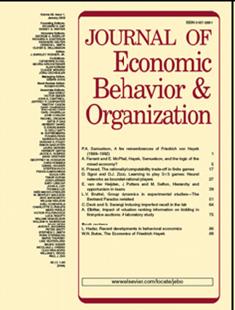
Team Building and Hidden Costs of Control
in: Journal of Economic Behavior and Organization, March 2016
Abstract
In a laboratory experiment, we investigate the interaction of two prominent firm strategies to increase worker effort: team building and control. We compare a team-building treatment where subjects initially play a coordination game to gain common experience (CE) with an autarky treatment where subjects individually perform a task (NCE). In both treatments, subjects then play two-player control games where agents provide costly effort and principals can control to secure a minimum effort. CE agents always outperform NCE agents. Conditional on control, however, CE agents’ effort is crowded out more strongly, with the effect being most pronounced for agents who successfully coordinated in the team-building exercise. Differential reactions to control perceived as excessive is one explanation for our findings.
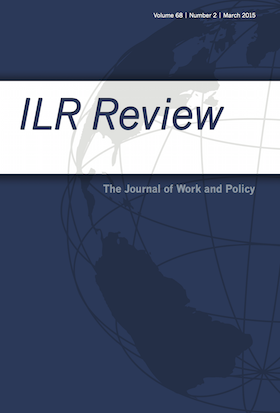
Dual Labor Markets at Work: The Impact of Employers’ Use of Temporary Agency Work on Regular Workers’ Job Stability
in: ILR Review, No. 5, 2016
Abstract
Fitting duration models on an inflow sample of jobs in Germany starting in 2002 to 2010, the author investigates the impact of employers’ use of temporary agency work on regular workers’ job stability. In line with dual labor market theory, the author finds that nontemporary jobs are significantly more stable when employers use temporary agency workers. The rise in job stability stems mainly from reduced transitions into nonemployment, suggesting that nontemporary workers are safeguarded against involuntary job losses. The findings are robust to controlling for unobserved permanent employer characteristics and changes in the observational window that comprises the labor market disruption of the Great Recession.
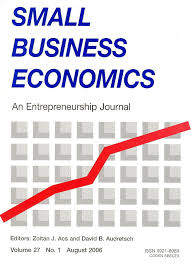
Spinoffs in Germany: Characteristics, Survival, and the Role of their Parents
in: Small Business Economics, No. 1, 2016
Abstract
Using a 50 % sample of all private sector establishments in Germany, we report that spinoffs are larger, initially employ more skilled and more experienced workers, and pay higher wages than other startups. We investigate whether spinoffs are more likely to survive than other startups, and whether spinoff survival depends on the quality and size of their parent companies, as suggested in some of the theoretical and empirical literature. Our estimated survival models confirm that spinoffs are generally less likely to exit than other startups. We also distinguish between pulled spinoffs, where the parent company continues after they are founded, and pushed spinoffs, where the parent company stops operations. Our results indicate that in western and eastern Germany and in all sectors investigated, pulled spinoffs have a higher probability of survival than pushed spinoffs. Concerning the parent connection, we find that intra-industry spinoffs and spinoffs emerging from better-performing or smaller parent companies are generally less likely to exit.
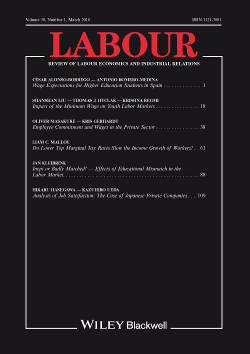
How Selective Are Real Wage Cuts? A Micro-analysis Using Linked Employer–Employee Data
in: LABOUR: Review of Labour Economics and Industrial Relations, No. 4, 2015
Abstract
Using linked employer–employee panel data for Germany, we investigate whether firms implement real wage reductions in a selective manner. In line with insider–outsider and several strands of efficiency wage theory, we find strong evidence for selective wage cuts with high-productivity workers being spared even when controlling for permanent differences in firms' wage policies. In contrast to some recent contributions stressing fairness considerations, we also find that wage cuts increase wage dispersion among peers rather than narrowing it. Notably, the same selectivity pattern shows up when restricting our analysis to firms covered by collective agreements or having a works council.

Does the Plant Size–wage Differential Increase with Tenure? Affirming Evidence from German Panel Data
in: Economics Letters, 2015
Abstract
We show that the major part of the plant size–wage premium in Germany is reflected in different wage growth patterns in plants of different size. This is consistent with the hypothesis that large firms ‘produce’ more skilled workers over time.
Working Papers
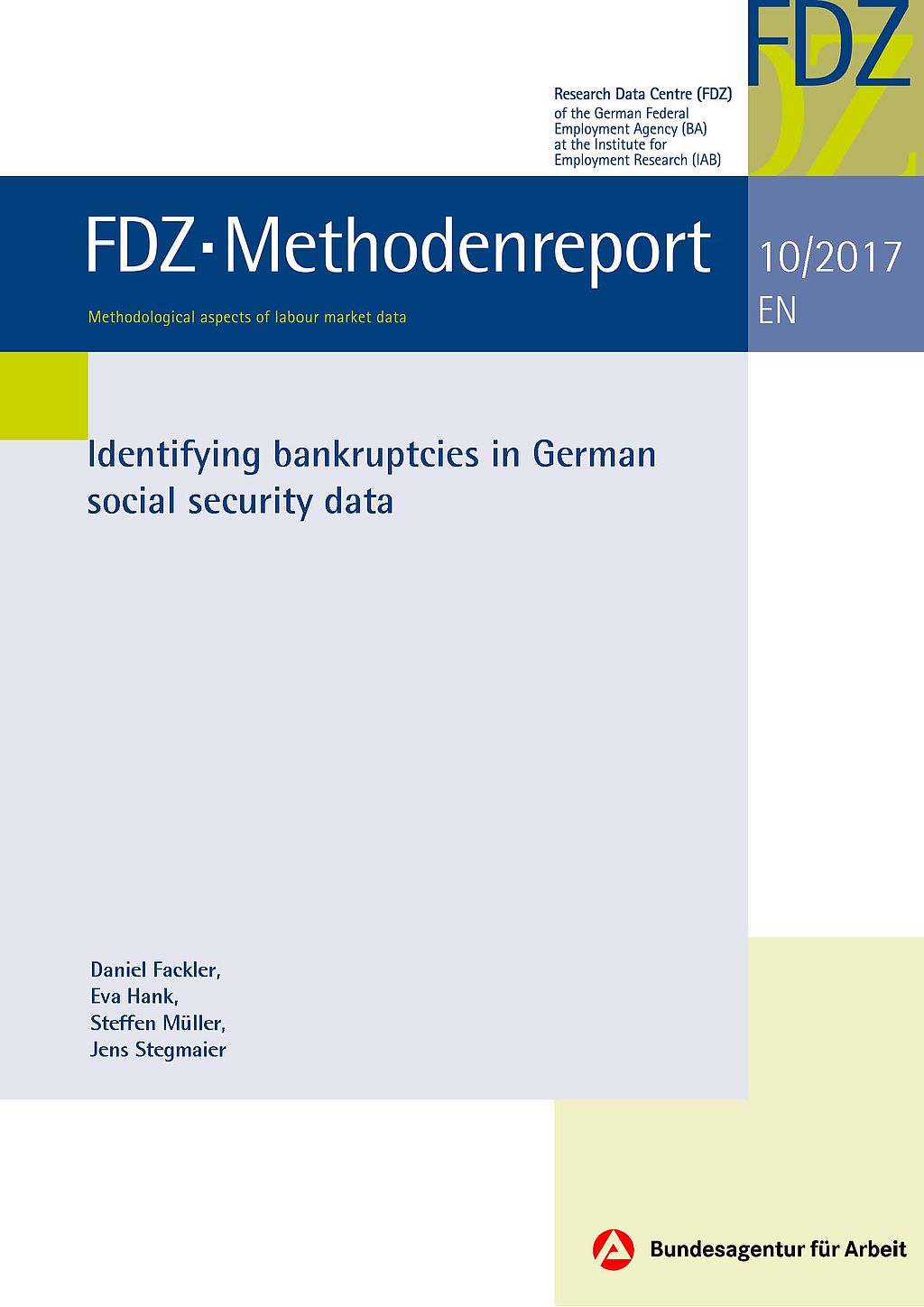
Identifying Bankruptcies in German Social Security Data
in: FDZ-Methodenreport, No. 10, 2017
Abstract
Many empirical studies about firm exits point out that it is important to distinguish between different types of closures, e.g., voluntary and involuntary liquidations. This report describes how exits due to bankruptcies can be identified in the German Establishment History Panel (BHP). In contrast to other closures, bankruptcies can be unambiguously regarded as indica-tion for economic failure and can therefore be interpreted as involuntary exits.


















